Figure 1.
B cells can play a key role in the pathogenesis of idiopathic nephrotic syndrome (INS) thorough different mechanisms. 1) They can produce several potentially pathogenic antibodies targeting proteins constitutively expressed by podocytes such as anti-CD40 IgG, found in adults with recurrent focal segmental glomerulosclerosis (FSGS), anti-UCHL1 IgG, found in children with steroid-sensitive nephrotic syndrome (SSNS) and anti-nephrin IgG, found both in children and adults with minimal change disease (MCD). In addition, B cells produce hyposialylated IgM directed against T cells, which impair T-cell responses to steroid inhibition, in a subgroup of children with SSNS. 2) Activated B cells can also exert antibody-independent detrimental effects: an increased amount of serum CD23, a marker of B-cell activation, has been reported in pediatric SSNS and increased levels of serum B-cell activating factor (BAFF) and IL-21, which can contribute to B-cell activation, have been observed in adult MCD patients. In an experimental mouse model, IL-4 secreting B cells activated locally in the glomerulus induce podocyte effacement and proteinuria. In addition, specific risk alleles in the HLA region, which plays a crucial role in the antigen presentation to T cells, have been described in children with SSNS. 3) Alterations in B-cell homeostasis have been also observed during the active phase of the disease, with increased circulating levels of total B cells and memory B cells in children with SSNS (3a), and increased circulating levels of plasmablasts in adults with MCD (3b).

